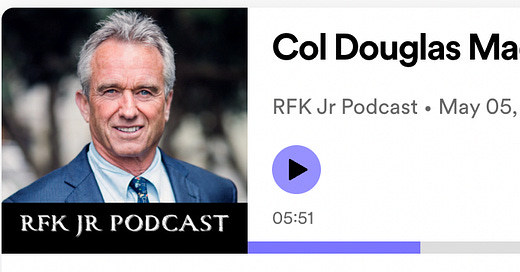RFK Jr. Interviews Col. Douglas Macgregor On Ukraine
Presidential candidate has frank conversation with leading critic of U.S. government and MSM orthodoxy.
By JOHN LEAKE
Demonstrating once again his extraordinary quality as a free and heterodox thinker, presidential candidate RFK, Jr. interviews Colonel Douglas Macgregor about U.S. policy in Ukraine in the May 5 episode of his podcast. It would be hard to overstate just how much this interview is a departure from conventional MSM and U.S. government orthodoxy and practice. Colonel Macgregor is without question the most knowledgable and strident critic of the U.S. government’s (blundering and destructive) war policy.
This seems a good place to note that the U.S. government and its ideologically possessed advisors apparently have NO concept of war beyond that of a resentful and violent adolescent who wishes to destroy his adversaries without considering the ultimate practical consequences of doing so. Contrast the warlords in Washington with the Prussian general and military theorist, Carl von Clausewitz, whose book, On War, presents an incomparably sensible definition of war as an instrument of international politics. Because Chapter 24 is so often poorly translated, I’ll include the original German and my translation.
24. Der Krieg ist eine bloße Fortsetzung der Politik mit anderen Mitteln
So sehen wir also, daß der Krieg nicht bloß ein politischer Akt, sondern ein wahres politisches Instrument ist, eine Fortsetzung des politischen Verkehrs, ein Durchführen desselben mit anderen Mitteln. Was dem Kriege nun noch eigentümlich bleibt, bezieht sich bloß auf die eigentümliche Natur seiner Mittel. Daß die Richtungen und Absichten der Politik mit diesen Mitteln nicht in Widerspruch treten, das kann die Kriegskunst im allgemeinen und der Feldherr in jedem einzelnen Falle fordern, und dieser Anspruch ist wahrlich nicht gering; aber wie stark er auch in einzelnen Fällen auf die politischen Absichten zurückwirkt, so muß dies doch immer nur als eine Modifikation derselben gedacht werden, denn die politische Absicht ist der Zweck, der Krieg ist das Mittel, und niemals kann das Mittel ohne Zweck gedacht werden.
24. War is a mere continuation of politics by other means
So we see that war is not just a political act, but a true political instrument, a continuation of political intercourse, carrying out the same thing with other means. What remains peculiar to war relates only to the peculiar nature of its means. The art of war in general, and the commander in each particular case of war, can demand that the directions and intentions of politics do not contradict these means. This requirement is no small order, but no matter how strongly these means affect political intentions in individual cases, they must always only be understood as a modification of them. For political intention is the end; war is the means, and the means can never be thought of without an end.
The psychopathic clowns in Washington, known by the stupid moniker “Neocons,” have no concept of war beyond the initial act of Blitzkrieg—that is, a coordinated and massive assault on the enemy’s army and infrastructure without any realistic plan for a constructive political settlement.
As a notable example of this, consider U.S. military policy during the Korean War.
"Over a period of three years or so, we killed off — what — 20 percent of the population," Air Force Gen. Curtis LeMay, head of the Strategic Air Command during the Korean War, told the Office of Air Force History in 1984. Dean Rusk, a supporter of the war and later secretary of state, said the United States bombed "everything that moved in North Korea, every brick standing on top of another." After running low on urban targets, U.S. bombers destroyed hydroelectric and irrigation dams in the later stages of the war, flooding farmland and destroying crops.
What was the final, political achievement of killing 20% of the North Korean population? (Imagine if a foreign air force killed 20% of the U.S. civilian population, or 66 million people. I wonder how we would feel about that).
What constructive political outcome did U.S. military policy achieve in Vietnam, Somalia, Afghanistan, Iraq, Libya, and Syria?
Regarding Ukraine, Colonel Macgregor says at the outset of his interview with RFK Jr.
I think we need to establish up front that there has never really been a strategy.
Please listen the fascinating interview in full.






RFK Jr has too much ethics & intelligence for politics. I would love to see him flip the switch on politics, it could be a really positive change for the US, and the West in general. He is a once off chance to clean the political scene, but that kind of progress will see powerful people challenged & they aren’t going to relinquish it easily.
Thanks for bringing this to our attention, John. $Billions being spent on a war with no end in sight. A travesty! Follow the money!!